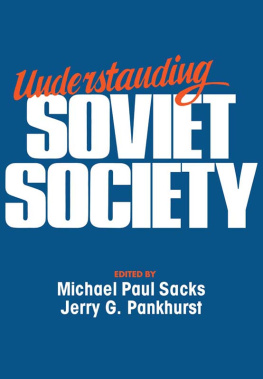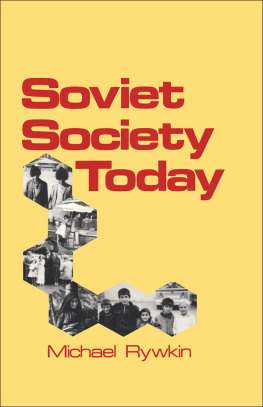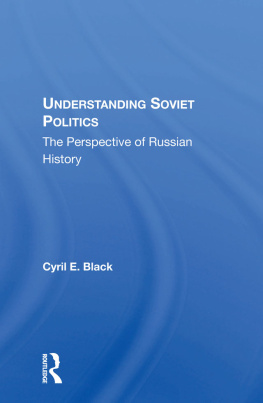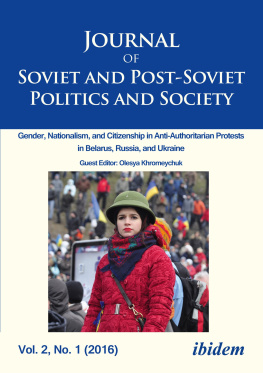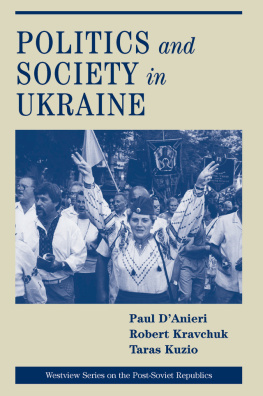UNDERSTANDING SOVIET SOCIETY
UNDERSTANDING SOVIET SOCIETY
Edited by
Michael Paul Sacks
Trinity College
and
Jerry G. Pankhurst
Wittenberg University
Copyright 1988 by Routledge
All rightsreserved
First published in 1988
Second impression 1989
Reprinted 2002
by Routledge
2 Park Square, Milton Park, Abingdon, Oxon, OX14 4RN
Transferred to Digital Printing 2006
Routledge is an imprint of the Taylor & Francis Group
Library of Congress Cataloging-in-Publication Data
Understanding Soviet society.
Bibliography: p.
Includes index.
1. Soviet Union Social conditions 1970
I. Sacks, Michael Paul. II. Pankhurst, Jerry G.
HN523.5.U53 1988 306'.0947 8718707
ISBN 0044450362
ISBN 0-04-445048-6 (pbk.)
British Library Cataloguing in Publication Data
Understanding Soviet society.
1. Soviet Union Social conditions 1970
I. Sacks, Michael Paul II. Pankhurst, Jerry G.
947.085'4 HN523.5
ISBN 0044450362
ISBN 0044450486 Pbk
Set in 10 on 12 point Garamond by Nene Phototypesetters Ltd
Publisher's Note
The publisher hasgone to great lengths to ensure
the quality of this reprint but points out that some imperfections in the
original may be apparent
Contents
RalphS. Clem |
Walter D. Connor |
Caroline Humphrey |
Michael Paul Sacks |
Robert A. Lewis |
Mark G. Field |
Thomas F. Remington |
Jerry G. Pankhurst |
Louise I. Shelley |
David Lane |
Ellen Jones |
Understanding Soviet Society has grown out of our experience as sociologists researching and teaching about the Soviet Union. It began as an update of our earlier volume, Contemporary Soviet Society: Sociological Perspectives (New York: Praeger, 1980), but developed well beyond a normal revised edition. This was the case not only because of the addition of six new authors, but also because of the major changes occurring in the USSR today that in many ways necessitated new approaches. Nevertheless, Understanding Soviet Society has profited from the many helpful comments on the earlier collection. Both professional colleagues in the social sciences and students in our classes have played an important role in determining the direction this work has taken, and we acknowledge their contributions.
More specifically, as this manuscript began shaping up, we both used some of the essays in our classes and received useful responses from our students, for which we are grateful. We also wish to thank the anonymous reviewers who, at two stages in the preparation of this book, provided us with very helpful reactions.
In the midst of rapid and important social change, one cannot hope to compile in a single volume a total, accurate picture of a complex society like the USSR. We have had neither aspiration nor pretense to be definitive in this volume, but it has nevertheless been both perplexing and exciting to make an effort in that direction. Hence, we dedicate the book to the so-called reformers who have made our task so difficult over the last couple of years. May their influence be only positive.
Imagine the contents of a book covering the essential characteristics of the American society. Even if it were restricted to aspects of primary interest to a sociologist, such a book would be a formidable undertaking. Indeed the vast majority of American sociology is really the sociology of the United States. Entire courses are devoted to the family, gender roles, ethnic relations, religion, politics, law, large organizations, education, social stratification, social problems, and more; and each course can assemble a multitude of books with diverse and sometimes conflicting interpretations and explanations.
The diversity of views held by the American public might best be illustrated from a review of the vast array of material, such as surveys of public opinion, in depth interviews with citizens, newspaper accounts, and editorials. Other aspects of the culture might be captured through describing contemporary novels, plays, and movies. These sources would reflect the regional differences, class differences, and changes over time that are often manifested in the differences between generations. Considering this you might quickly conclude that it would be absurd to believe that a single volume could achieve any kind of comprehensive understanding of the United States, especially for someone lacking experience living in the society.
When considering Soviet society, however, we tend to see the subject as much more manageable, and many books are available with titles suggesting that a relatively brief account can suffice. Western news accounts about particular events in the Soviet Union often contain broad generalizations to show the reader how the new information fits a broader (and usually quite familiar) picture. These generalizations tend to emphasize the overarching role of the state and are meant, often implicitly, to draw a sharp contrast with the United States. As Hough (1977, 22628) has pointed out, when comparisons are made between the West and the Soviet Union there is a particularly strong tendency to oversimplify both systems and to neglect information that does not conform to this image.
The recently established Center for War, Peace and the News Media at New York University has been studying the distortions and stereotypes regarding the Soviet Union that appear in the US media. Among other aspects considered, the Center exposes para-information that subtly embodies interpretations about the nature of Soviet and American societies and is encoded in the stories. The Co-director of the Center, Robert Karl Manoff (1986, 3), provides three illustrations: (1) an article in the New York Times, in which Philip Taubman concludes his account of a press conference with a high political official by noting that there was a willingness to talk about almost any subject but not to challenge basic Soviet values; (2) a report from the Los Angeles Times Washington Post that Premier Ryzhkov had spoken about the problems of the economy after Brezhnev's death in the Kremlin tradition of assigning blame to predecessors; and (3) the comment by Betsy Aaron in an ABC television program that a dedicated Party member knows the rules: Never criticize the system, criticize the circumstances; the story regarded a worker who said, we never blame, we criticize when asked about blame for river pollution.
Manoff (1986, 3) contends that the assumptions about Soviet society in each case
might become clear if readers were to interrogate the texts. They might ask the New York Times, which was disappointed that a-high Soviet official did not challenge basic Soviet values: When has an American done the equivalent, kept his job? They might ask the Los Angeles Times, which viewed criticism of predecessors as a Kremlin tradition: What was President Reagan up to the week before when he faulted previous administrations for weakening the country's strategic forces? Or, they might ask ABC, which found Communist cant in the preference for criticism over blame: What is to be made of Esalen or the self-help books that offer the same advice from every paperback counter in America? And they might also ask ABC, since Aaron found it a Party rule to criticize only circumstances: Is [it] really the American way to criticize the system?

